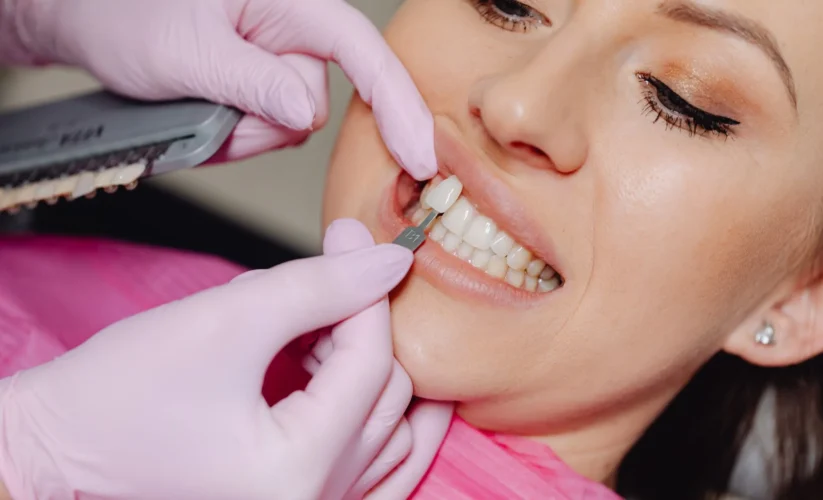
How Does Teeth Prepped for Veneers Works
Dental veneers give your teeth a pleasant look, and therefore they can change your appearance and give you confidence. Prior to application of the dental veneers, teeth will be prepared for achieving the best result possible. This technique involves brushing, scrubbing and polishing the teeth while removing thin enamels. Creating models of shaped teeth, imprints and sometimes temporary veneers are included in the procedure.
The composite-like veneers are attached to your natural teeth using the special anaesthetic after teeth’s preparation for perfect adhesive application. Teeth Prepped for Veneers is the answer to make sure it sits properly and looks natural, thereby, this will also relate to how it binds and how it looks.
When to Get Teeth Prepped for Veneers
Teeth prepped for veneers are typically candidates for the procedure when they exhibit certain conditions, such as:
- Chips
- Cracks
- Misshapen teeth
- Gaps between teeth
- Discoloration due to aging, trauma, or excessive fluoride exposure
- Root canal therapy
Benefits of Teeth Prepped for Veneers
The objective behind Tooth Prepped for Veneers is to enhance the look.
The veneers bring beauty to your teeth by making them brighter and more equally shaped. They do a variety of cosmetic fixes, for example smoothing chips, restoring stains, filling gaps, and correcting odd shapes. These veneers can last for many years, more than ten years just if you take care of them properly. They ensure also that the condition of the gums is above par, thus you might not need too much dental work.
As they don’t stain or decay, bacterial attack is prevented, so your real teeth remain undamaged. Teeth Prepped for Veneers process works quickly, thus you don’t have to wait too long to see the results they bring. Wearing braces is a comforting addition that can help you become more confident about how you look.
Besides, they are also simple to carry on, only as if you do your regular teeth cleaning by brushing and flossing. If you practice good care on them, veneers are capable of lasting for several years as well. They can be made of many different kinds of materials and they have different prices, so you can choose the ones that best suit your budget and lifestyle.
Teeth Prepping for Veneers: Steps
Consultation and Planning
They’ll examine your teeth and determine if veneers are suitable. X-rays might be taken to assess your tooth structure and jawbone health. Together, you’ll decide on the desired shade, size, and shape of your veneers.
Anesthesia

Local anesthesia is typically used to numb the area around the teeth being prepped.
Enamel Removal
A small amount of enamel (usually 0.5 to 1 millimeter) is removed from the front surface of the tooth. The amount removed depends on the desired thickness of the veneer and the existing tooth structure.
Taking Impressions
Once the teeth are prepped, impressions are taken using either traditional putty molds or digital scans. These impressions are sent to a dental lab for the creation of your custom veneers.
Temporary Veneers
In some cases, temporary veneers might be placed on the prepared teeth. These offer protection and allow you to experience your new smile temporarily.
The entire Teeth Prepped for Veneers process typically takes about 30 to 60 minutes per tooth.
Type of Teeth Prepping
Minimal Preparation Veneers:
Involves removing the least amount of tooth structure, typically in the range of 0.3 to 0.5mm, often limited to enamel only.
Classic Preparation Veneers:
Requires more tooth structure removal, usually 0.5mm or more, to accommodate thicker veneers like conventional porcelain veneers
More Aggressive Preparation Veneers:
In cases where significant changes are needed, up to 1.5mm of tooth structure may be removed, potentially reaching into the dentin layer.
Common Concerns about Tooth Preparation
The common fear when you are getting Teeth Prepped for Veneers is certain. It comprises of us causing issues, like over grinding the tooth, under grinding it, hurting the inner part of the tooth, wire breaking problems, and wrongly preparing the tooth. Discarding off too much from the tooth makes it vulnerable and prone to sensitivity or inside damage. If the wear of the tooth is not sufficient, the facade things may not fit well and it can look difform.
The heat from cooking the unit may even cause damage inwards leading to discomfort or the necessity to do more treatments. It is a hard job for dental technicians to make the dentures perfectly customized and how long they will hold is also affected. An error in both the preparation of teeth for fitting, quite similar to that in how well the veneers fit and stay put.
Estimated Cost
Usually, it’s between $800 and $2,500 per tooth for materials like porcelain veneers. For composite resin veneers, it might be $250 to $1,200 per tooth. No-prep veneers can be around $1,500 to $2,500 per tooth. Insurance usually won’t pay for veneers because they’re seen as a cosmetic treatment.
Post Care
After getting your teeth prepped for veneers, you may avoid hard or sticky foods initially, practicing good oral hygiene, and attending follow-up appointments as scheduled. Be gentle with your new veneers, avoid habits like nail-biting or using teeth as tools, and maintain regular dental check-ups to ensure the longevity of your veneers. If you experience any issues or discomfort, contact your dentist promptly for guidance and assistance.





